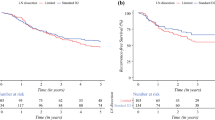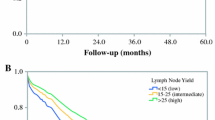Abstract
Purpose
Aging societies comprise an increasing number of elderly gastric cancer (GC) patients. We herein attempted to determine whether D2 lymphadenectomy is beneficial for older GC patients.
Methods
We retrospectively analyzed a multi-institutional dataset including 3484 patients who received surgical resection for GC. For the analysis, we selected patients aged ≥ 80 years who were clinically diagnosed with T1N + or T2-4 GC. To balance the essential variables including the type of gastrectomy and the stage of progression, propensity score matching was conducted, and we compared the background clinical factors and postoperative outcomes of the patients allocated to the D2 (n = 87) and non-D2 (n = 87) dissection groups.
Results
The D2 group had significantly longer operative times, more blood loss, and more retrieved lymph nodes (median 32 vs 24, P < 0.001) than the non-D2 group. The D2 group had a greater incidence of intra-abdominal abscesses (grade ≥ II in the Clavien–Dindo classification) than the non-D2 group (3.5% vs 0%, P = 0.040). The overall disease-specific and relapse-free survival rates of the D2 group tended to be poorer than those of the non-D2 group (hazard ratios 1.49, 1.70 and 1.14, respectively).
Conclusions
D2 lymphadenectomy for older patients with GC conferred little benefit regarding overall survival despite an occurrence of increased complication rates.




Similar content being viewed by others
References
Ministry of Health LaW. Vital statistics Japan. 2019. https://www.mhlw.go.jp/english/index.html.
Service CI. Cancer Statistics in Japan. 2019. https://ganjoho.jp/en/.
Endo S, Shimizu Y, Ikenaga M, Ohta K, Yamada T. Survival benefit of gastrectomy for gastric cancer in patients %3e/=85 years old: a retrospective propensity score-matched analysis. Surgery. 2017;161(4):984–94.
Mengardo V, Cormack OM, Weindelmayer J, Chaudry A, Bencivenga M, Giacopuzzi S, et al. Multicenter study of presentation, management, and postoperative and long-term outcomes of septegenerians and octogenerians undergoing gastrectomy for gastric cancer. Ann Surg Oncol. 2018;25(8):2374–82.
Hikage M, Tokunaga M, Makuuchi R, Irino T, Tanizawa Y, Bando E, et al. Surgical outcomes after gastrectomy in very elderly patients with gastric cancer. Surg Today. 2018;48(8):773–82.
Cho GS, Kim W, Kim HH, Ryu SW, Kim MC, Ryu SY, et al. Multicentre study of the safety of laparoscopic subtotal gastrectomy for gastric cancer in the elderly. Br J Surg. 2009;96(12):1437–42.
Lee JH, Lee CM, Son SY, Ahn SH, Park DJ, Kim HH, et al. Laparoscopic versus open gastrectomy for gastric cancer: long-term oncologic results. Surgery. 2014;155(1):154–64.
Kunisaki C, Akiyama H, Nomura M, Matsuda G, Otsuka Y, Ono HA, et al. Comparison of surgical outcomes of gastric cancer in elderly and middle-aged patients. Am J Surg. 2006;191(2):216–24.
Chen J, Chen J, Xu Y, Long Z, Zhou Y, Zhu H, et al. Impact of age on the prognosis of operable gastric cancer patients: an analysis based on SEER database. Medicine (Baltimore). 2016;95(24):e3944.
Sasako M, Sano T, Yamamoto S, Kurokawa Y, Nashimoto A, Kurita A, et al. D2 lymphadenectomy alone or with para-aortic nodal dissection for gastric cancer. New Engl J Med. 2008;359(5):453–62.
Fang C, Hua J, Li J, Zhen J, Wang F, Zhao Q, et al. Comparison of long-term results between laparoscopy-assisted gastrectomy and open gastrectomy with D2 lymphadenectomy for advanced gastric cancer. Am J Surg. 2014;208(3):391–6.
Japanese gastric cancer treatment guidelines 2014 (ver. 4). Gastric cancer : official journal of the International Gastric Cancer Association and the Japanese Gastric Cancer Association. 2017;20(1):1–19.
Nakagawa N, Kanda M, Ito S, Mochizuki Y, Teramoto H, Ishigure K, et al. Pathological tumor infiltrative pattern and sites of initial recurrence in stage II/III gastric cancer: propensity score matching analysis of a multi-institutional dataset. Cancer Med. 2018;7(12):6020–9.
Ryo S, Kanda M, Ito S, Mochizuki Y, Teramoto H, Ishigure K, et al. The controlling nutritional status score serves as a predictor of short- and long-term outcomes for patients with stage 2 or 3 gastric cancer: analysis of a multi-institutional data set. Ann Surg Oncol. 2019;26(2):456–64.
Nakanishi K, Kanda M, Ito S, Mochizuki Y, Teramoto H, Ishigure K, et al. Delay in initiation of postoperative adjuvant chemotherapy with S-1 monotherapy and prognosis for gastric cancer patients: analysis of a multi-institutional dataset. Gastric Cancer. 2019;22(6):1215–25.
Kanda M, Murotani K, Kobayashi D, Tanaka C, Yamada S, Fujii T, et al. Postoperative adjuvant chemotherapy with S-1 alters recurrence patterns and prognostic factors among patients with stage II/III gastric cancer: a propensity score matching analysis. Surgery. 2015;158(6):1573–80.
Sasahara M, Kanda M, Ito S, Mochizuki Y, Teramoto H, Ishigure K, et al. The preoperative prognostic nutritional index predicts short-term and long-term outcomes of patients with stage II/III gastric cancer: analysis of a multi-institution dataset. Dig Surg 2020;37(2):135–44.
Liu L, Bai Y, Gu H, Zhu H, Yu Y, Lu P, et al. The prognostic efficacy of the 8th edition UICC TNM classifications for gastric cancer in Chinese patients: a study based on follow-up system of nursing department. Medicine (Baltimore). 2018;97(36):e12284.
Dindo D, Demartines N, Clavien PA. Classification of surgical complications: a new proposal with evaluation in a cohort of 6336 patients and results of a survey. Ann Surg. 2004;240(2):205–13.
Songun I, Putter H, Kranenbarg EM, Sasako M, van de Velde CJ. Surgical treatment of gastric cancer: 15-year follow-up results of the randomised nationwide Dutch D1D2 trial. Lancet Oncol. 2010;11(5):439–49.
Memon MA, Subramanya MS, Khan S, Hossain MB, Osland E, Memon B, et al. Meta-analysis of D1 versus D2 gastrectomy for gastric adenocarcinoma. Ann Surg. 2011;253(5):900–11.
Suzuki S, Kanaji S, Matsuda Y, Yamamoto M, Hasegawa H, Yamashita K, et al. Long-term impact of postoperative pneumonia after curative gastrectomy for elderly gastric cancer patients. Ann Gastroenterol Surg. 2018;2(1):72–8.
Wang S, Xu L, Wang Q, Li J, Bai B, Li Z, et al. Postoperative complications and prognosis after radical gastrectomy for gastric cancer: a systematic review and meta-analysis of observational studies. World J Surg Oncol. 2019;17(1):52.
Kanda M, Ito S, Mochizuki Y, Teramoto H, Ishigure K, Murai T, et al. Multi-institutional analysis of the prognostic significance of postoperative complications after curative resection for gastric cancer. Cancer Med. 2019;8(11):5194–201.
Sakuramoto S, Sasako M, Yamaguchi T, Kinoshita T, Fujii M, Nashimoto A, et al. Adjuvant chemotherapy for gastric cancer with S-1, an oral fluoropyrimidine. New Engl J Med. 2007;357(18):1810–20.
Yang W, Hu R, Li GC, Zhou ML, Wang Y, Shen LJ, et al. Survival outcomes and patterns of failure after D2 dissection and adjuvant chemoradiotherapy for locally advanced gastric cancer: a retrospective study. Br J Radiol. 2018;91(1089):20170594.
Sasako M, Sakuramoto S, Katai H, Kinoshita T, Furukawa H, Yamaguchi T, et al. Five-year outcomes of a randomized phase III trial comparing adjuvant chemotherapy with S-1 versus surgery alone in stage II or III gastric cancer. J Clin Oncol. 2011;29(33):4387–93.
Bennett-Guerrero E, Hyam JA, Shaefi S, Prytherch DR, Sutton GL, Weaver PC et al. Comparison of P-POSSUM risk-adjusted mortality rates after surgery between patients in the USA and the UK. Br J Surg. 2003;90(12):1593–8.
Author information
Authors and Affiliations
Corresponding author
Ethics declarations
Conflict of interest
Takahiro Shinozuka and other co-authors have no conflicts of interest to declare in association with this study.
Additional information
Publisher's Note
Springer Nature remains neutral with regard to jurisdictional claims in published maps and institutional affiliations.
Rights and permissions
About this article
Cite this article
Shinozuka, T., Kanda, M., Ito, S. et al. D2 lymph node dissection confers little benefit on the overall survival of older patients with resectable gastric cancer: a propensity score-matching analysis of a multi-institutional dataset. Surg Today 50, 1434–1442 (2020). https://doi.org/10.1007/s00595-020-02021-7
Received:
Accepted:
Published:
Issue Date:
DOI: https://doi.org/10.1007/s00595-020-02021-7




